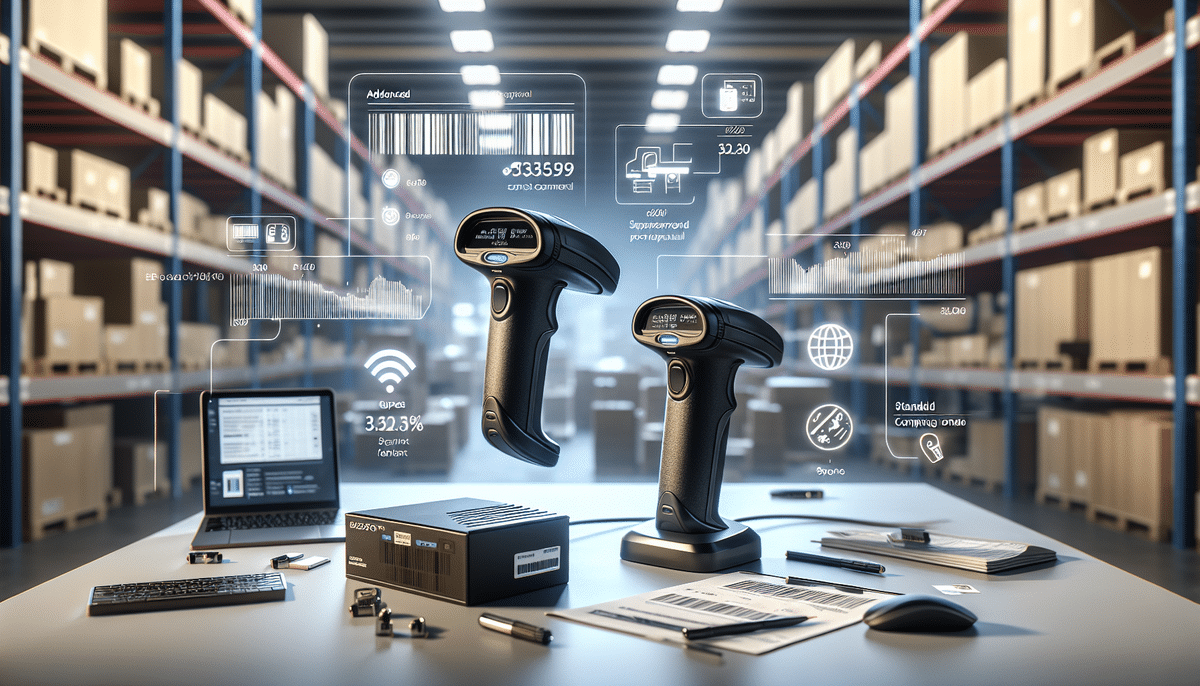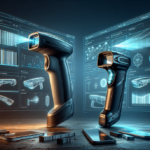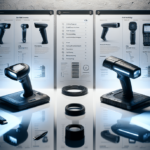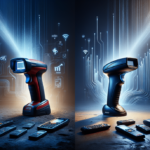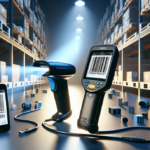Zebra DS8178 vs Zebra DS2208: Comprehensive Barcode Scanner Comparison
Barcode scanners are essential tools for modern businesses, enabling efficient and accurate tracking of inventory, assets, and transactions. Selecting the right barcode scanner can be a challenging decision given the multitude of options available. Two popular choices are the Zebra DS8178 and the Zebra DS2208. This article explores the similarities and differences between these two scanners, focusing on key features, performance, ease of use, durability, and cost to help you make an informed decision for your business needs.
Understanding Barcode Scanners and Their Importance in Modern Businesses
Barcode scanners are devices that interpret the information stored in barcodes, enabling businesses to accurately track their inventory and streamline operations. In today's fast-paced business environment, barcode scanners are indispensable tools that save time, minimize errors, and enhance efficiency. According to a Statista report, the global barcode scanning market is projected to reach over $5 billion by 2025, underscoring their critical role in various industries.
With the right barcode scanner, businesses can automate tasks such as inventory management, sales transactions, and shipping and receiving, resulting in increased productivity and profitability. One of the key benefits is the ability to provide real-time data on inventory levels, allowing businesses to quickly identify when stock is running low and reorder items before they deplete. Additionally, barcode scanners reduce the risk of human error by eliminating the need for manual data entry, ensuring accurate information capture even in low-light or high-volume environments.
Another advantage of barcode scanners is their versatility. They can be utilized across various industries, including retail, healthcare, manufacturing, and logistics. The rise of mobile barcode scanners, which can be integrated with smartphones or tablets, allows employees to scan barcodes on the go and access real-time data from anywhere, further enhancing operational flexibility and efficiency.
Key Features of the Zebra DS8178 Scanner
The Zebra DS8178 is a high-performance handheld scanner renowned for its advanced scanning capabilities and comprehensive data capture. Its key features include:
- Advanced Barcode Scanning Technology: Capable of reading virtually any barcode type, including 1-D, 2-D, and PDF417 barcodes, ensuring compatibility with a wide range of applications.
- Bluetooth 4.0 Wireless Connectivity: Enables remote scanning and seamless communication with other devices, facilitating mobile operations.
- High-Speed Scanning: Can capture up to 240 images per second, making it one of the fastest scanners available, which is crucial for high-volume scanning environments.
- Durable Construction: Built to withstand multiple drops from up to 6 feet and features an IP65 sealing rating for resistance to dust and water, ensuring longevity in harsh settings.
- User-Friendly Design: Equipped with a bright LED indicator and haptic feedback for easy scanning and error correction, enhancing user experience.
In addition to its advanced scanning capabilities and durable build, the Zebra DS8178 offers a long battery life of up to 14 hours, ensuring reliability throughout even the busiest workdays. Its compact size and ergonomic design provide comfort during extended use, making it suitable for industries such as retail, healthcare, and manufacturing where prolonged handling is common.
Key Features of the Zebra DS2208 Scanner
The Zebra DS2208 is a versatile and affordable scanner ideal for small and medium-sized businesses. Its key features include:
- 2-D Barcode Scanning Technology: Capable of reading all standard 1-D and 2-D barcodes, including QR codes and GS1 DataBar barcodes, ensuring broad compatibility.
- USB Connectivity: Supports plug-and-play operation, allowing for easy integration with most POS systems and computers without the need for additional software.
- Superior Scanning Performance: Features a high-resolution sensor that can capture barcodes from up to 24 inches away, providing flexibility in scanning distances.
- Robust Construction: Designed to withstand multiple drops from up to 5 feet and has an IP42 sealing rating for protection against dust and water, offering reliability in various environments.
- Sleek and Ergonomic Design: Lightweight and comfortable grip reduces operator fatigue, enhancing user comfort during extended use.
The Zebra DS2208 also boasts a user-friendly interface that allows for easy configuration and customization. Its wide working range makes it suitable for various applications, including retail, healthcare, and manufacturing. With its affordable price point and reliable performance, the DS2208 is an excellent investment for businesses looking to streamline operations and improve productivity without a significant upfront investment.
How to Choose the Right Barcode Scanner for Your Business Needs
Selecting the right barcode scanner for your business depends on several factors, including your budget, specific business needs, and application requirements. Consider the following factors when making your decision:
- Types of Barcodes: Determine the variety of barcode types you need to scan, such as 1-D, 2-D, QR codes, or specialized formats like PDF417.
- Scanning Range and Speed: Assess the required scanning distance and speed based on your business operations, especially if dealing with high-volume scanning.
- Durability and Ruggedness: Consider the operating environment to ensure the scanner can withstand drops, dust, moisture, and other potential hazards.
- Connectivity Options: Decide between wired (USB) or wireless (Bluetooth) connectivity based on your workflow and mobility needs.
- Ease of Setup and Use: Evaluate how easy the scanner is to configure and use, including the availability of user-friendly features like LED indicators and feedback mechanisms.
- Cost and Value for Money: Balance the initial investment with the scanner's features, performance, and longevity to ensure it offers good value for your budget.
Zebra DS8178 vs Zebra DS2208: A Detailed Comparison of Technical Specifications
Below is a detailed comparison of the technical specifications of the Zebra DS8178 and the Zebra DS2208:
| Specification | Zebra DS8178 | Zebra DS2208 |
|---|---|---|
| Barcode Scanning Technology | 1-D, 2-D, PDF417 | 1-D, 2-D, QR codes, GS1 DataBar |
| Connectivity | Bluetooth 4.0 Wireless | USB Wired |
| Scanning Range | Up to 29.5 inches | Up to 24 inches |
| Scanning Speed | Up to 240 images per second | 60 frames per second |
| Durability | Multiple drops from up to 6 feet, IP65 sealing rating | Multiple drops from up to 5 feet, IP42 sealing rating |
| Dimensions | 7.3 x 3 x 5.6 inches | 6.5 x 2.6 x 3.9 inches |
| Weight | 8.6 ounces | 5.9 ounces |
| Price | Higher | Lower |
Performance Review: Zebra DS8178 vs Zebra DS2208
Both the Zebra DS8178 and the Zebra DS2208 offer excellent scanning capabilities and accuracy. However, the DS8178 holds a slight advantage over the DS2208 in speed and scanning range. The DS8178 can capture images at a rate of up to 240 images per second and has a scanning range of up to 29.5 inches, making it more suitable for environments requiring rapid and long-distance scanning.
Moreover, the DS8178's advanced scanning technology allows it to capture virtually any barcode, enhancing its versatility compared to the DS2208. This makes the DS8178 particularly advantageous in settings where a diverse array of barcode types is prevalent.
According to industry benchmarks, high-speed scanners like the DS8178 can significantly improve throughput in high-volume settings, reducing wait times and increasing operational efficiency (GS1 Barcode Standards).
Ease of Use: Setting Up and Operating the Zebra DS8178 vs Zebra DS2208
Both the Zebra DS8178 and the Zebra DS2208 are designed to be user-friendly and easy to set up. The DS2208 is a plug-and-play scanner that requires no additional software or drivers, allowing it to be operational quickly. This feature is ideal for businesses that need a scanner to be up and running with minimal setup time.
The DS8178, while offering wireless connectivity, requires Bluetooth pairing before use. However, this is a straightforward process that can be completed in a few simple steps, ensuring that users can easily integrate the scanner into their existing workflows. Both scanners feature bright LED indicators and haptic feedback, providing clear signals when a barcode has been successfully scanned, thereby enhancing the overall user experience.
Additionally, the DS8178 offers advanced configuration options through Zebra’s software, allowing for customization to meet specific business needs, which can be beneficial for larger operations.
Durability and Reliability: Evaluating the Longevity of Zebra DS8178 vs Zebra DS2208
Durability and reliability are critical factors in selecting a barcode scanner, especially in demanding business environments. The Zebra DS8178 is built to be more durable and rugged than the DS2208. It can withstand multiple drops from heights of up to 6 feet and has an IP65 sealing rating, offering excellent protection against dust and water ingress.
In comparison, the DS2208 is also robust, capable of withstanding drops from up to 5 feet, and has an IP42 sealing rating, which provides some protection against dust and water but is less comprehensive than the DS8178. For businesses operating in harsher environments or requiring a longer lifespan from their equipment, the DS8178 is the more reliable choice.
Reliability is further supported by Zebra’s industry reputation for producing high-quality, long-lasting barcode scanners trusted by businesses worldwide (Zebra Support).
Cost Comparison: Value for Money with Zebra DS8178 vs Zebra DS2208
Cost is always a significant consideration when selecting equipment for your business. The Zebra DS2208 is more budget-friendly compared to the DS8178, making it an attractive option for small and medium-sized businesses that require reliable scanning without a substantial financial outlay.
Conversely, the Zebra DS8178, while priced higher, offers advanced scanning capabilities, superior performance, and greater durability. For businesses that demand high-performance scanners capable of handling high-volume scanning and enduring rigorous use, the DS8178 provides better value for money despite the higher initial investment.
When evaluating cost versus benefits, consider the total cost of ownership, including maintenance, durability, and the potential for increased productivity and reduced errors with a higher-end scanner like the DS8178.
Use Cases: Best Applications for Zebra DS8178 and DS2208 Scanners
The Zebra DS2208 is ideal for small to medium-sized businesses that require a reliable and affordable scanner for basic barcode scanning tasks. Common use cases include:
- Inventory Management
- Point-of-Sale Transactions
- Light Retail Scanning
On the other hand, the Zebra DS8178 is better suited for businesses that require advanced scanning capabilities, high-speed scanning, and rugged durability. Ideal industries and use cases include:
- Manufacturing
- Transportation and Logistics
- Healthcare
- Warehousing
For example, in a warehouse setting where high-volume and long-range scanning are necessary, the DS8178 can significantly enhance operational efficiency compared to the DS2208.
Customer Reviews and Ratings: Insights on Zebra DS8178 and DS2208
Both the Zebra DS8178 and the Zebra DS2208 have garnered positive reviews and high ratings from customers. Users consistently praise these scanners for their ease of use, scanning accuracy, and durability.
The Zebra DS8178: Customers highlight its advanced scanning capabilities and rugged design, noting its ability to handle a wide range of barcode types and its reliability in demanding environments. The high scanning speed is frequently mentioned as a significant advantage for high-volume operations.
The Zebra DS2208: Users appreciate its affordability and simplicity, making it an excellent choice for businesses with budget constraints. The plug-and-play functionality and comfortable design are also commonly praised, along with its reliable performance for standard scanning needs.
Overall, both scanners receive commendations for their performance and reliability, with the DS8178 being favored in high-demand scenarios and the DS2208 being appreciated for cost-effectiveness and ease of use.
Conclusion and Recommendation: Choosing Between Zebra DS8178 and DS2208
Choosing the right barcode scanner for your business ultimately depends on your specific needs, budget, and application requirements. If your business requires a reliable and affordable scanner for basic barcode scanning tasks, the Zebra DS2208 is the best choice. It offers simplicity, reliability, and excellent value for money, making it ideal for small to medium-sized businesses.
However, if your business demands advanced scanning capabilities, high-speed scanning, and rugged durability to handle high-volume operations and harsh environments, the Zebra DS8178 is the better option. Its superior performance and durability make it a worthwhile investment for businesses that prioritize efficiency and long-term reliability.
Overall, both scanners offer excellent performance, ease of use, and reliability, making them top choices for businesses looking to enhance their inventory tracking and streamline operations. Assess your specific needs and consider the factors outlined in this article to determine which scanner aligns best with your business objectives.













